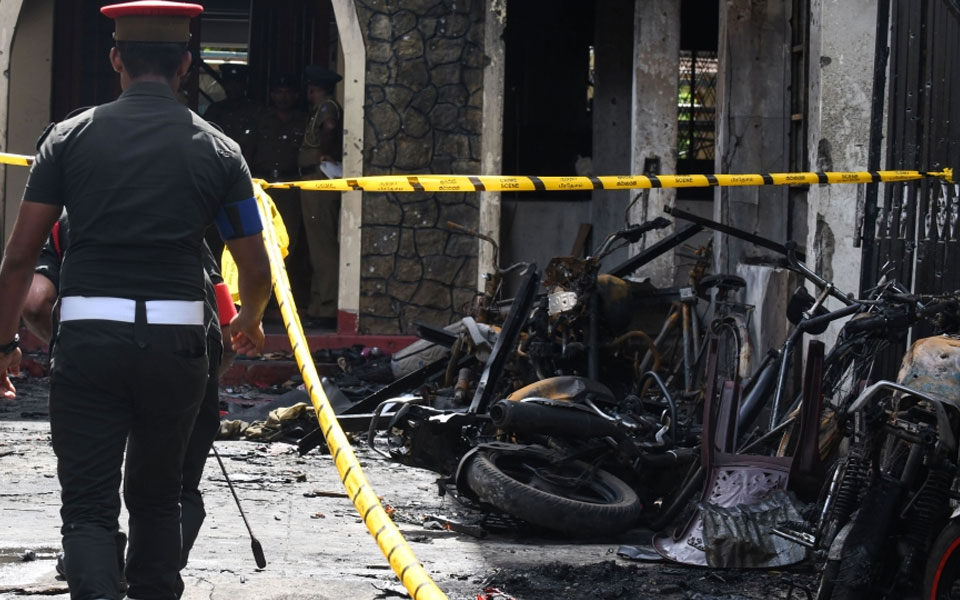Colombo: Nine suicide bombers, including a woman, were involved in the massive Easter Sunday bombings and 60 people have been arrested so far for their suspected links to Sri Lanka's worst terror attack that killed at least 359 people, a top police officer said Wednesday.
Suicide bombers, believed to be members of local extremist group, carried out a series of devastating blasts that tore through churches and luxury hotels in Sri Lanka on Sunday.
The state minister of defence Ruwan Wijewardena said the multiple bomb attacks were carried out not by the National Tawheed Jamath (NTJ) but by its splinter group.
Sri Lanka's government had earlier blamed the blasts on the NTJ.
Wijewardena told reporters that the members of the group had differences and the final attack was carried out by a group that left the main NTJ.
The Islamic State terror group has claimed the attack, although it did not provide direct evidence of its involvement. Wijewardena said there was no evidence at present whether the splinter group had any foreign connections.
Out of the nine suicide bombers, eight have been identified by the Criminal Investigation Department (CID), Police Spokesman Ruwan Gunasekara said.
The ninth bomber was confirmed as the wife of one of the suicide bombers, he said.
He said the death toll has jumped to 359 on Wednesday, up from a previous count of 321 people. Nearly 500 people have been injured in the attack.
Ten Indian nationals have been confirmed dead.
Sixty people have been arrested for possible links to the multiple attacks carried out on Easter Sunday. Of them, 32 are in custody with the CID. All of those arrested are of Sri Lankan nationality, Gunasekara said.
State defense minister Wijewardene said the majority of Sunday's suicide bombers were from well-heeled families. They were also well-educated, including at least university graduate who had studied abroad.
"Most of them are well-educated, and come from maybe middle- or upper-middle-class. So they are financially quite independent and their families are quite stable financially," he said.
Wijewardene said, "We believe that one of the suicide bombers studied in the UK and maybe later on did his post-graduate in Australia, before coming back to settle in Sri Lanka."
The number of foreign nationals who have been identified as killed is 34. Additionally, 14 foreign nationals are unaccounted for at present, and could be among the unidentified victims at the Colombo Judicial Medical Officer's mortuary, officials said.
Sixteen foreign nationals injured in the attacks are receiving treatment at the Colombo National Hospital and private hospitals in Colombo while others have been treated and discharged.
An attack on a fourth hotel on Sunday was foiled, Prime Minister Ranil Wickremesinghe said on Tuesday. He also warned that more militants and explosives could still be "out there" following the attack.
The country remains tense with police still looking for suspects and possible further explosives. But Wickremesinghe said the attacks "could not have been done just locally". "There had been training given and a coordination which we are not seeing earlier," he said.
A state of emergency remains in effect to prevent further attacks. The emergency powers allow the security forces to crackdown in law and order breaches by sudden searches of property, arrests and detention of people indefinitely.
Speaking in parliament the former commander of the Army, Field Martial Sarath Fonseka said removing the police chief Pujith Jayasundera was not answer to the security lapse which had led to the attacks. The government had demanded Jayasundera's resignation.
President Maithripala Sirisena in an address to the nation on Tuesday said that he would effect a shuffle in the security establishment within 24 hours. It was expected that he would call for the resignation of Jayasundera.
Let the Truth be known. If you read VB and like VB, please be a VB Supporter and Help us deliver the Truth to one and all.
Dubai: Smoke was seen rising from an area near the United States Consulate in Dubai, according to witness accounts cited by Reuters.
There was no immediate official confirmation on the extent of damage or whether there were any casualties in the incident.
Earlier, the US embassy in Riyadh, Saudi Arabia’s capital, was also attacked. Authorities reported damage to the premises, but no casualties were recorded.
The developments come amid heightened tensions in the region, with Iran continuing to target US interests in the Middle East following deadly attacks launched on Saturday by Israel and the United States.
Near US embassy in Dubai pic.twitter.com/z5VTZNVxNO
— Sahil Shah (@thesahilsshah) March 3, 2026





